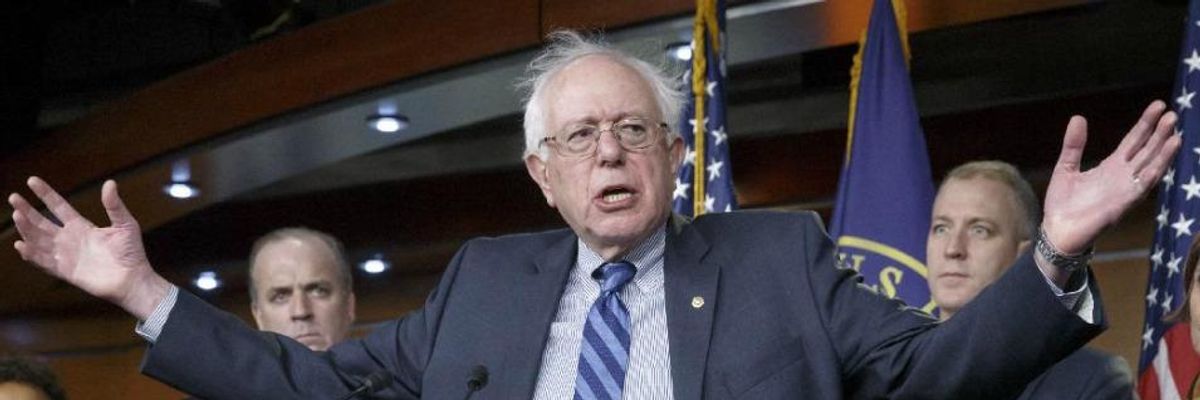Ahead of upcoming trips to both New Hampshire and Iowa, Sen. Bernie Sanders (I-Vt) is talking again this week about his possible plans to run for president in 2016 and made it clear that although his platform would center around propping up the nation's working class while undoing the damage being wrought by the nation's oligarchy, he will not shy away from putting pressure on Hillary Clinton, currently and widely seen as the presumptive Democratic nominee.
"We're going to need bold leadership, we're going to need people prepared to take on, frankly, the billionaire class." --Sen. Bernie Sanders (I-Vt)"Based on [Clinton's] history, do I think she is going to be as bold as needs to be in addressing the major crises that we face?" Sanders said in an interview with the Washington Post on Thursday. "Probably not."
Though he was reluctant to be specific in his critique of the former Secretary of State's record and admitted he "may be surprised" by Clinton's ability to tap into the populist angst in the country, when asked by the Post about what he's heard from Clinton regarding economic inequality and related issues, Sanders responded with, "Not much."
Separately, in an interview set to air on C-SPAN's Newsmakers this Sunday, Sanders makes it clear that his current strategy is less about targeting Clinton and much more about raising, with urgency, the issues that neither of the two major parties have proven capable of addressing: the rise of of the billionaire class, the impact of money in politics, the unprecedented threat of climate change, and a generation of wage stagnation as proof that the economic system in the U.S. has become beholden to the nation's wealthiest individuals and corporate powerbrokers at the expense of the chronically unemployed, the working poor and the middle class.
"All I know is if I run, I'm not running against Hillary Clinton," Sanders said in the C-SPAN interview. "What Hillary Clinton, or Mitt Romney, or anybody else has to say -- that's their business. And once we're in a campaign, I can debate those issues."
According to Politico:
Absent a change of heart by Sen. Elizabeth Warren, Sanders is seen as perhaps the Democratic Party's best vessel to channel populist outrage and push Clinton to the left in the Democratic primary. But he insisted that if he were to run, it wouldn't be for that reason.
Sanders said his biggest causes on the campaign trail would be the "collapse of the middle class," the rise of what he called the Koch brothers' political "oligarchy" and the GOP's position on climate change, which the senator called an "international embarrassment."
"These and other issues are looming in front of us. And we're going to need bold leadership, we're going to need people prepared to take on, frankly, the billionaire class," he said.
Still, Sanders is cautious about launching a quixotic campaign. He stressed that he won't run if he "can't do it well" and worries whether he can raise enough money to compete with the Clinton machine or deep-pocketed Republicans.
"My God ... if you run for president, you're going to need a gazillion dollars," Sanders said. "I will not run for president if I can't do it well and if I can't run to win."
As part of his positioning for a presidential run, Sanders last month released what he calls "An Economic Agenda for American," a twelve-point plan designed "to create jobs, raise wages, protect the environment and provide health care for all."
Sanders has said he will announce relatively soon whether or not he will officially place his hat in the ring for 2016. Pressed by the Post, Sanders said essential to his final decision is whether or not his candidacy can harness what he believes is a deep and widely-shared dissatisfaction with the status quo that is simmering within the American electorate.
"'Can you bring people out on the streets? Can you mobilize people? Can you tap the anger that's out there?'" said Sanders. "And the answer is, you know what, at this moment, I don't exactly know that you can."
